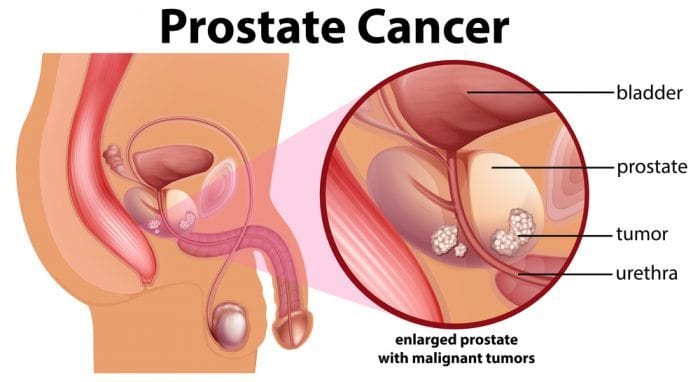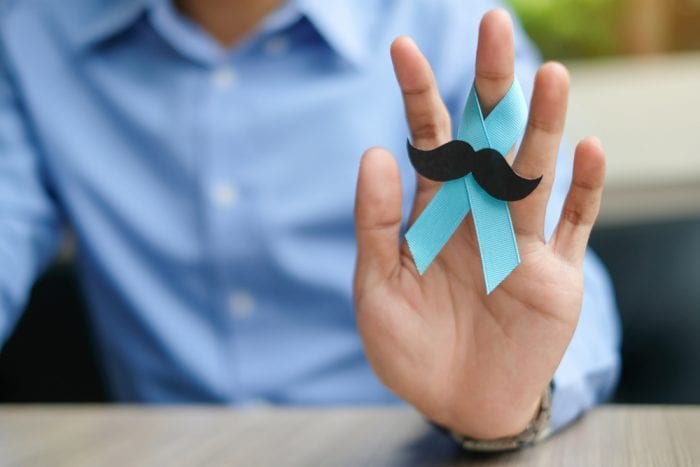
Studies show that CBD and prostate cancer are not compatible. CBD is killing it.
Prostate cancer is global health problem and is the most common type of cancer in American men, and second leading cause for the cancer-related death. Experimental evidence shows that prostate cancer tissue contains excess cannabinoid receptors. When CBD and prostate cancer make contact, it’s the cancer that loses.
Prostate cancer cells have increased expression of CB1 and CB2 receptors over their healthy counterparts. Activation of these receptors leads to apoptosis (cell death) for the cancer cells. A secondary response is a decrease in testosterone and a decrease in prostate specific antigen, known as PSA, which also benefit the patient.
Even with the widespread screening of male patients, using PSA, there are 5% of cases that will have metastasis at the time of diagnosis. The most common site of spread is to the bone. The patient will frequently experience symptoms of pain and functional impairment.
At this advanced stage, there are few curative treatment options. This underscores the urgent need for novel treatment for prostate cancer. Cannabinoids and their derivatives have drawn renewed attention due to the discovery of their diverse pharmacologic activities, including: cell growth inhibition, anti-inflammatory effects and tumor regression.
Study Shows Cannabinoids Induce Cell Death in Prostate Cancer
A study in 2005 showed the expression of both CB1 and CB2 receptors were significantly higher in the prostate cancer cells compared to the normal prostate cells (in vitro). The results demonstrated that treatment of the prostate cancer cell line with the cannabinoid CB1/CB2 agonist (such as THC and CBD) resulted in a significant dose- and time- dependent decrease in the cell viability. The cannabinoids increased apoptosis of the cancer cells at the 24hr and 48hrs, without significant impact on the normal prostate cells.
Androgens, such as testosterone, are involved in the maintenance and progression of prostate cancer. The androgen receptor is one area of study for understanding this hormonal action. The 2005 study also showed that stimulation of the cannabinoid receptors resulted in a significant decrease in the androgen receptor protein expression. There was also a dose-dependent decrease in the PSA and secreted PSA at 24 hrs. PSA is considered the most sensitive marker and screening tool for the prostate cancer to date-its regulation is androgen dependent.

High CB1 Receptor Count Associated With Poor Outcome
A separate study determined that high cannabinoid CB1 receptor volume was associated with greater disease severity and poorer outcome in the prostate cancer patients. The patients with high CB1 receptor counts showed a significantly worse survival rate than those with low CB1 receptor results. One possible explanation was in harmony with other studies that showed the expression of the CB1 receptors is regulated by the local endocannabinoid release. Patients with low endocannabinoid tone cause the body to increase the rate of receptor proliferation to compensate for these low levels of endocannabinoids.
CBD and Prostate Cancer: What Does This Mean for Cancer Patients?
To summarize, cancer cells have higher affinity (due to increase in CB receptors count) for cannabinoids than normal cells. When the cancer cells are treated with the cannabinoids, they display three specific effects:
- The cells become less viable, more susceptible to the apoptosis
- Androgen receptor activity on the cancer cell surface decreases (prostate cancer cells are propelled by androgens, male hormones)
- CBD discourages the formation of the cancer blood vessels (angiogenesis) required for the tumor to nourish itself

With such a promising results on the treatment of the prostate cancer cells, what is currently happening with prostate cancer patients? Well, unfortunately not much. There is some anecdotal evidence of the patients using the CBD to shrink the prostate cancer, and success in combining the CBD oil with the traditional therapies.
Researchers are calling for clinical trials with patients. It is clear that CBD and prostate cancer are bitter foe. CBD can keep cells from proliferating, spreading, building their own food supply and taking up androgens. In addition, one study even confirmed the synergistic effects of cannabinoids and chemotherapy (docetaxel) and hormone therapy (bicalutamide).
Hopefully, after all these positive effects and relaxing of the cannabis regulations we can expect a surge in the clinical trials to fight this deadly disease.
Source:https://www.rxleaf.com



